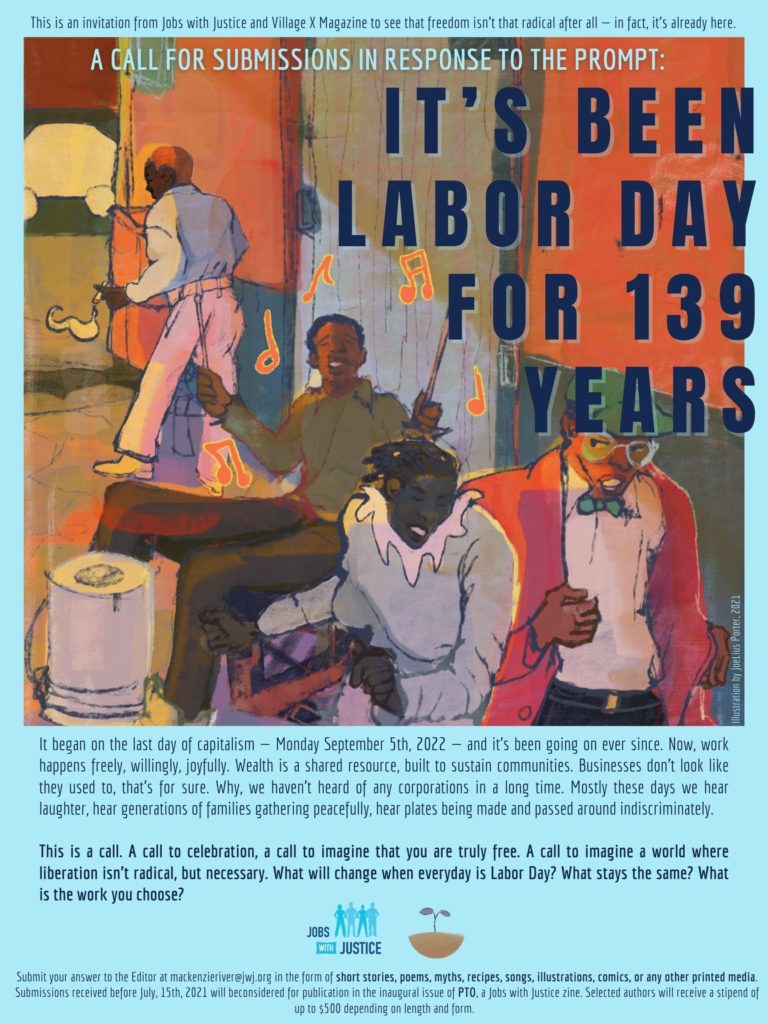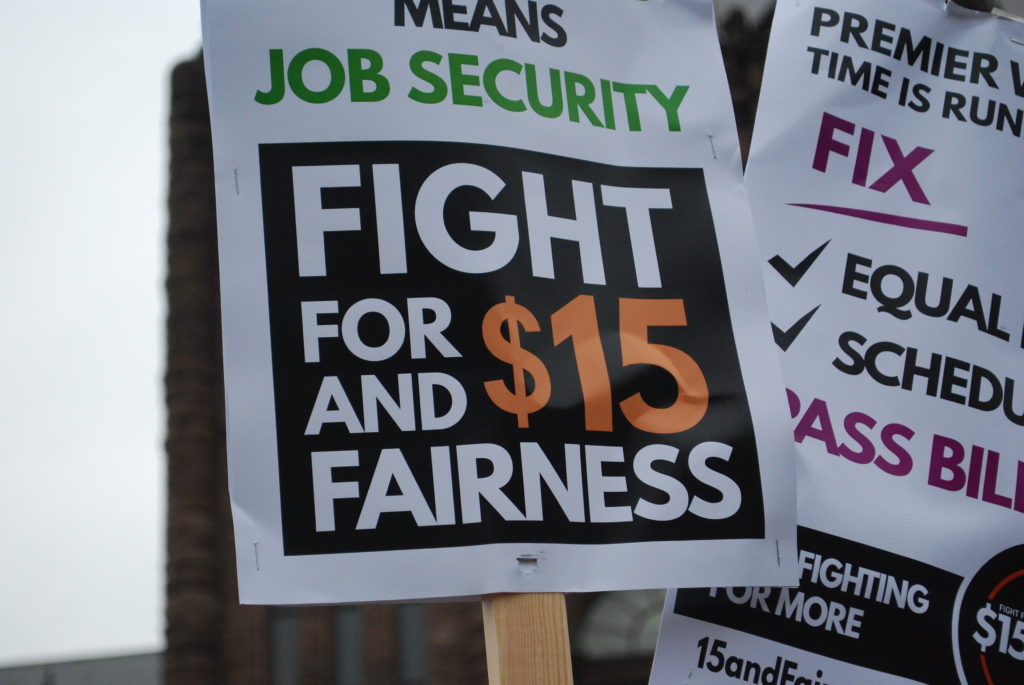Summer 2021 Newsletter
Welcome to the Summer 2021 edition of Jobs With Justice quarterly newsletter! This update provides you – our most dedicated supporters and allies – a way to dig into the ongoing campaigns and work of Jobs With Justice and our network throughout the year. We hope you enjoy it!
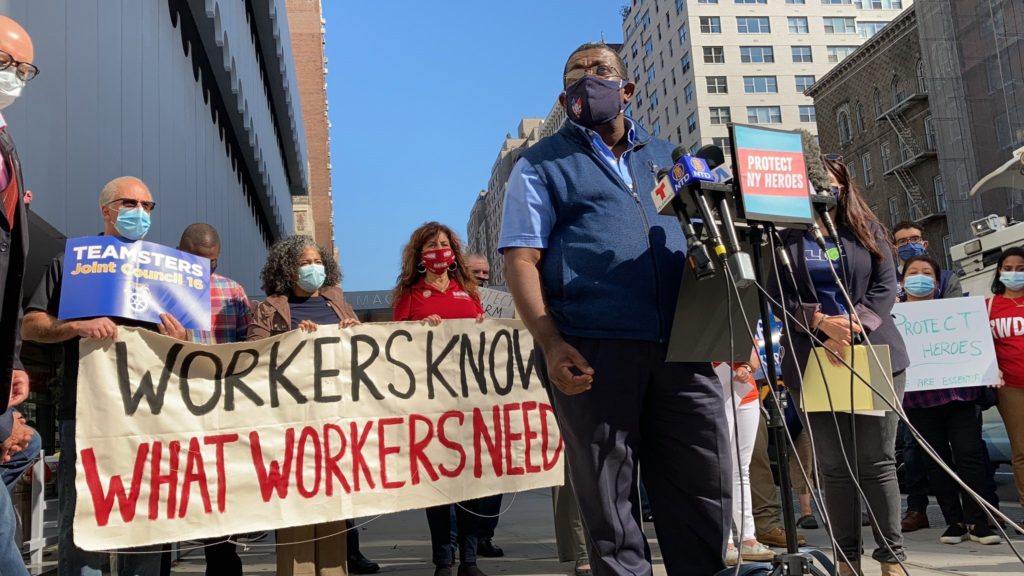
Why Haley Carrera and Other Workers Need the PRO Act Now
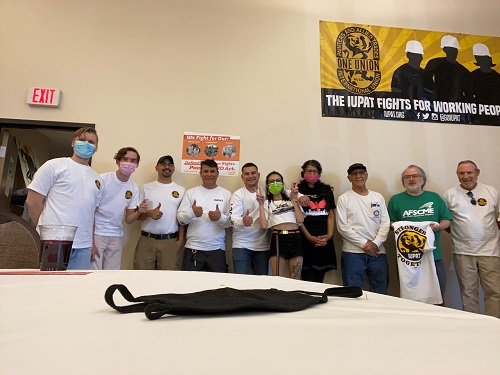
For Haley Carrera, a fourth-generation Arizonan, organizer, and essential worker in the restaurant industry, the PRO Act is more than just a piece of legislation making its way through an embattled Senate. It’s potentially life-altering. “As workers, we are often bullied and harassed and are expected to smile and nod, and take it without standing up for ourselves. We are expected to work double after double after double because we are short-staffed, and we don’t have to luxury of putting in a resignation. It’s just wrong,” she points out.
The Protecting the Right to Organize Act — or PRO Act— passed the House of Representatives in March and includes important provisions to advance workers’ rights. They include overriding state right to work laws and allowing unions to collect dues from workers that opt-out, banning employer interference and influence in union elections, protections for undocumented workers, and creating monetary penalties for companies and executives that violate workers’ rights. This last provision is critical, as workers around the country have faced hostile environments from managers and owners. “I can remember working at a place during the pandemic and the owner comes to me, all of 4’9” and wearing a big gold ring—asks me ‘what do you think about all this Black Lives Matter shit?’ It was unbelievable,” Carrera recounts.
When essential workers like Carrera are not stressed about hearing their managers take on “Marxist Antifa” or U.S. immigration policy, they often deal with harassment from customers. Carrera can recall keeping a list of names of folks that would make a habit of calling the restaurant to harass her specifically. “There’s so much waste and paranoia in that environment—you know? You are touching other people’s forks, knives, glasses–and some customers want to get into it with you about masks. What are you supposed to do?”
The PRO Act seeks to empower unions, understanding the critical role they play to protect working people from the often exploitative grip of employers and ensures workers have decision-making power. Expanding the space for collective bargaining can strengthen worker power and allow them to control their own destinies. For Carrera, the legislation’s arrival is both necessary and fundamental. “It is so beyond ridiculous that we are even debating the right to protest and organize as a felony. It shakes me to my core that a violation of a first amendment is a debate in Congress because conservates saw how well it worked last year when masses of people came out to say we do not like our current living situation.”
Always Essential Campaign Winning Big for Essential Workers
In a Major Victory for Workers, the NY HERO Act is Now the Law of the Land in New York
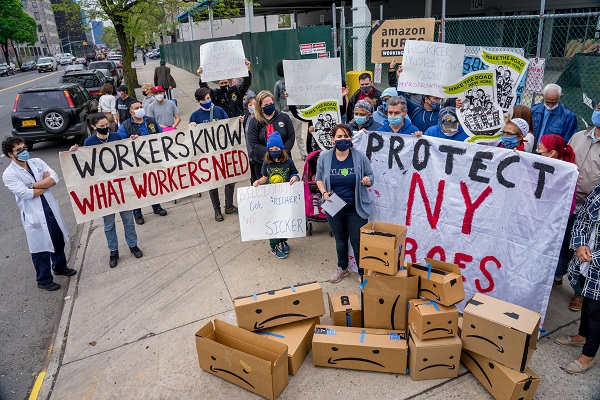
On May 5, New York Governor Andrew Cuomo made it official when he signed the NY HERO Act. The law is the culmination of tireless and dedicated work from Jobs With Justice local coalition Alliance for a Greater New York (ALIGN) who joined with key partners like New York Communities for Change, Make the Road New York, and Make the Road New Jersey to form the New York Essential Workers Coalition (NYEWC) to address inequities and strengthen health protections, safeguard against workplace retaliation, and offer a platform for essential workers to share their stories. This victory is the result of these incredible activists and further proof that a better world is possible.
Colorado Jobs With Justice Secures Huge Victory with Agricultural Workers Right Bill Passage
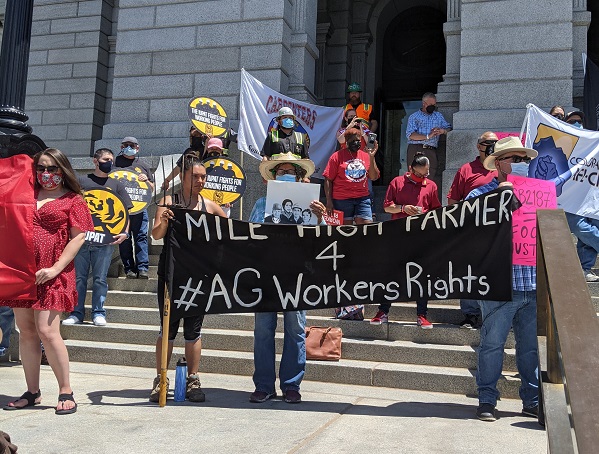
Colorado Jobs With Justice and workers everywhere achieved a hard-fought victory when Senate Bill 87 passed the Colorado Senate and House of Representatives. The historic bill will give farmworkers the right to organize or join labor unions, protect workers and whistleblowers from retaliation for reporting abuse, earn state minimum wage as well as overtime pay. The bill’s passage can be attributed to the hard organizing work that Colorado Jobs With Justice and coalition partners like FrontLine Farming, Project Protect Food Systems, Colorado Organization for Latina Opportunity and Reproductive Rights, Colorado Immigrant Rights Coalition – CIRC, and Colorado AFL-CIO sustained throughout. The bill is expected to be signed into law by Colorado Governor Jared Polis.
In celebration of this groundbreaking development, Colorado Jobs With Justice put out a statement. “It took the courage, dedication, and strength of workers, community [organizations], labor and people of faith to come together to advocate in support of SB 87. The next stop is Governor Jared Polis signing the bill into law this Friday, June 25th! Thank you to all the people who made this happen, especially the #alwaysessential workers who shared their stories to paint the reality of what it is to be a farmworker and what #agworkersrights truly means!”
Always Essential Campaign Looking to Win Big in the Lone Star State
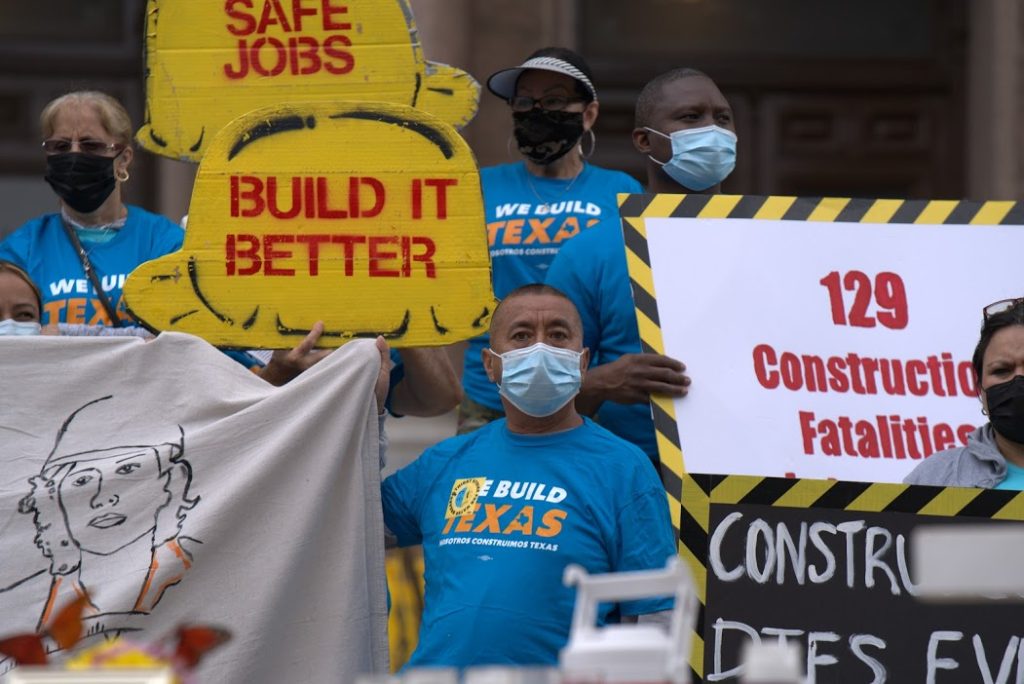
Securing transformational change for workers can be a herculean task anywhere, especially in Texas, where pro-worker wins can seem almost impossible.
And yet, the magnitude of this challenge is exactly why Jobs With Justice’s Always Essential Campaign is looking to fight in the Lone Star State. “We know that Texas is a right-to-work state and very anti-worker, so if we can do it here, we can do it anywhere,” says Marté Valadez, an organizer at national Jobs With Justice.
The campaign aims to create an essential worker board representing workers from multiple industries in Harris County, Texas. They include airport workers, security workers, janitors, construction workers, retail and domestic workers. Essential Workers Power, the name of this coalition, is led by Worker Defense Project and represented by National Domestic Workers Alliance (NDWA), We Dream in Black and Fe y Justicia (NDWA affiliates), Service Employees International Union (SEIU Texas), and United for Respect.
The county would empower this task force to ensure that corporations and small-scale employers are not undermining the health and safety of their employees on the job. Harris County, which represents Houston, is a place that 5 million people call home—a population larger than 26 states. The county is seen as a progressive oasis in the state, and campaign organizers see County Judge Lina Hidalgo as someone who can champion this essential worker board and help build worker power. “It’s important to understand that in Harris County, Hidalgo is in some ways the de facto mayor. She is the person who chairs the county commissioners’ meetings and can be influential in what could be an equally split vote on this. The priority for us right now is getting Judge Hidalgo to see the urgency in our work,” Valadez points out.
After experiencing a major setback in Texas due to winter storms in March, the focus for Always Essential advocates has been on building out a communications and membership strategy. Once this is in place, training and developing members on the board and empowering the community to hire a board director and secure staff will be the priority, and attaining county support for proper training and development. Once this is in place, the board can fight for safe workplaces and living wage jobs while being accountable to essential workers around the county, helping to leverage victories for organizing campaigns. There is a growing sense across the country that the pandemic is in its final days, and this perception is one that activists are acutely aware of. They have had to adapt on the fly. “We had to be ready for this quick push for re-opening. We knew that the back-to-business and normal would be pushed hard, particularly in Texas. What we want to make clear is that the reality is we need infrastructure where workers are equipped to respond alongside local government in future disasters and pandemics. Workers should be at the forefront of the conversation, not an afterthought,” Valadez contends.
Deep Dives into Jobs With Justice-supported Worker Fights Across the Country
Massachusetts Jobs With Justice at the Heart of Historic Nurses Fight in Worcester
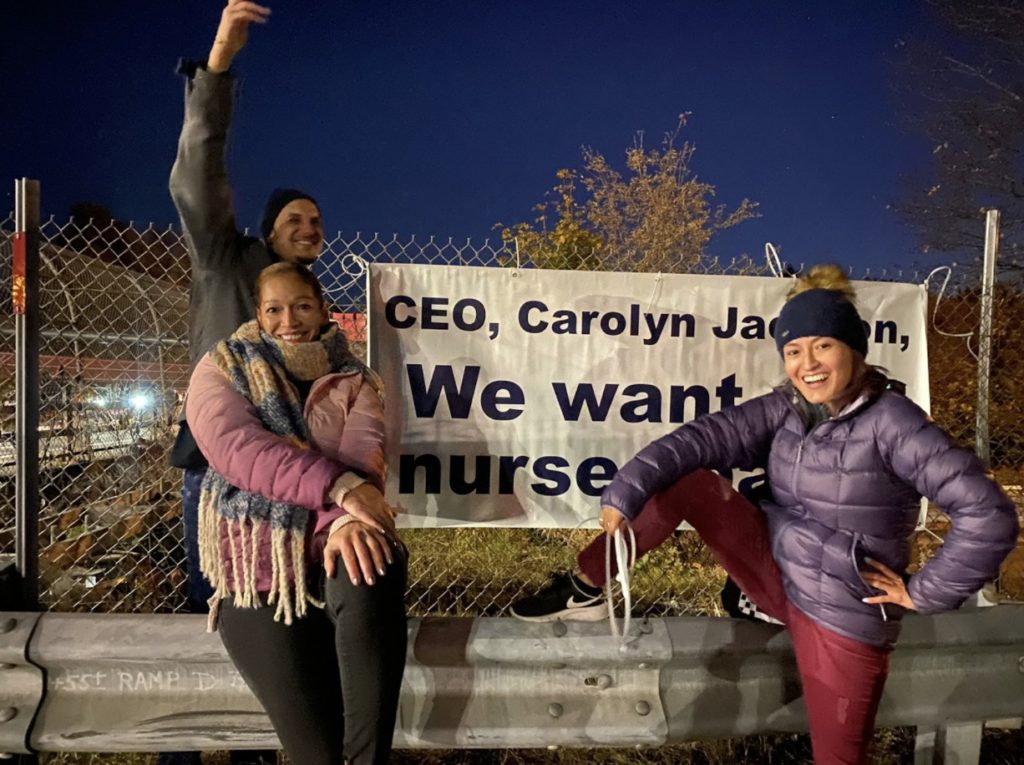
When Dallas based behemoth Tenet Healthcare registered a $97 million profit margin during the first quarter of 2021, mere days after nurses at its St. Vincent facility went on strike in protest of unsafe working conditions in Worcester, it became clear to even the most detached observers what kind of entity the nurses were fighting against. But for many inside New England’s second-biggest city, this fight was years in the making, well before the strike’s March 8 start and Tenet’s quarterly earnings report was announced.
“It was two years of failed labor management and negotiations. We lived through more than a year of the most horrific time we’ve ever had in our professional lives caring for the sickest patient, and it became clear to us then that this would end in some union action because this corporation is intent on backing the backs of its nurses,” says Marie Ritacco, a registered nurse at St. Vincent and Vice President of the Massachusetts Nurses Association.
Among the conditions the nurses dealt with included far too few nurses on shift, caring for extremely sick patients that required far more intensive support and seemingly minimal help from their employer to alleviate them. Even though Tenet announced in February that it had posted $414 million in profits during the pandemic while receiving $3 billion in funding from the federal government stimulus relief packages. In fact, the company has already spent $75 million on replacement nurses and security detail, more than enough funds to meet the nurses’ original demands.
The strike is currently over 105 days old, making it the longest nurses strike nationally in 17 years and the second longest nurses strike in Massachusetts history. Throughout the fight, Massachusetts Jobs With Justice has stood firm with the nurses and spurred community support around their demands. “Massachusetts JWJ has been an amazing partner in this strike from the beginning,” David Schildmeier, Director of Public Communications at Massachusetts Nurses Association, points out. “Their early support gave the strike a strong community angle and really provided credibility. This has been a strike that has galvanized the Worcester community like I’ve never seen.”
Worcester native and Massachusetts Jobs With Justice organizer Nelly Medina put the strike in full context, arguing that the issues here are much bigger than the nurses. “These are white women with master’s degrees that they are leaving out in the element, hundreds of them, so what does that mean for the black and brown essential worker? They are not just standing on the line for themselves, this about something much bigger. This is about gentrification, capitalism, and a system that’s going to put all our faces in the mud if we don’t support these nurses.” Where the strike is headed next is hard to say, but for Ritacco and the 700 other nurses at St. Vincent, solidarity is key. “If they think they have ground us down, they are wrong. We are much stronger than we were on March 8.”
Jobs With Justice Local Coalitions Leading the Way in Remaking the Construction Industry
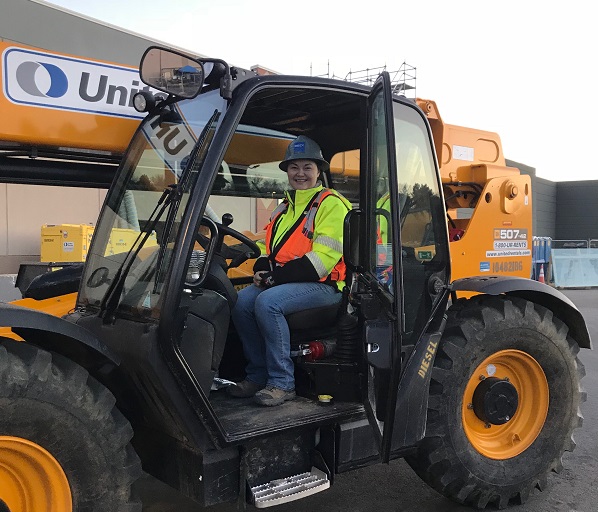
Women and people of color are marginalized throughout much of the American economy, but in the construction industry, that marginalization is particularly intensified. A group of Jobs With Justice local coalitions are looking to change this dynamic and bring real equity to an industry lacking it.
Emerging during what many are hoping is the final stage of a global pandemic, coalitions like Colorado Jobs With Justice are taking major steps to create equity in the construction sector. Two years ago, the coalition launched and continues to host bi-monthly meetings of Equity and Possibilities in Construction (EPIC) members and intentional one on ones and outreach to bring more women into union committees. The table exists in critical coordination with the International Union of Painters and Allied Trades (IUPAT) and the International Brotherhood of Electrical Workers (IBEW). One major goal of this project is developing apprenticeship programs and the cultivation of social networks for women aimed at solidarity.
Equity and Possibilities in Construction is building the pathway for women and BIPOC to enter the Building and Construction Trade Unions in Colorado.
Recently Colorado Jobs With Justice held a virtual EPIC event during women’s history month, seeking to uplift women’s history in the labor movement in Colorado. The convening also sought to inspire women in the building trades industry to demand change for women of color in the construction industries. Leah Rambo, an instrumental labor leader, provided the keynote address at this event. Rambo is the Training Director and Fund Administrator at the International Association of Sheet Metal, Air, Rail and Transportation Workers (SMART) Local 28 in New York City.
From leading the effort with the SMART International Women’s Committee to change the SMART constitution to include gender-neutral language to leading the effort to make sexual harassment in the workplace a serious offense and bolstering equity standards and accountability with the contractors association, Rambo’s Inspirational words resonated with EPIC members in attendance at this convening. Organizers are excited about planning future sessions to build from the energy and power honed at the event. EPIC will begin hosting in-person meetings again at the end of the summer, with a fundraising gala to be held in September – details to follow from this.
But while the social aspect of this work is critical, organizers understand that it is all about leveraging power to create change.
Through the Better for All campaign, organizers in Colorado, Central Florida, and Nashville continue to push union leaders to pressure President Biden’s administration to take a stand around equity issues in the infrastructure bill. Chief among the demands being made includes Black workers, undocumented workers, and gender non-conforming workers—the historically marginalized.
These demands are manifested through executive orders, where organizers aim to establish affirmative relief protections for undocumented workers and much stronger hiring standards intended to help retain BIPCOC, women, and other minority workers.
As always, Jobs With Justice seeks to connect national fights with local ones, such as linking activists in Colorado, Central Florida, and Nashville into the campaign narrative and demands of the Better For All campaign. Regardless of the locality of the fight, these Jobs With Justice coalitions, adjacent partners, and aligned Union partners are well aware that a centuries-old problem is going to take sustained action and discipline for the duration, and thus far, they are proving that they are more than up to that task.
Unveiling the Hard Truths of Florida’s Construction Boom
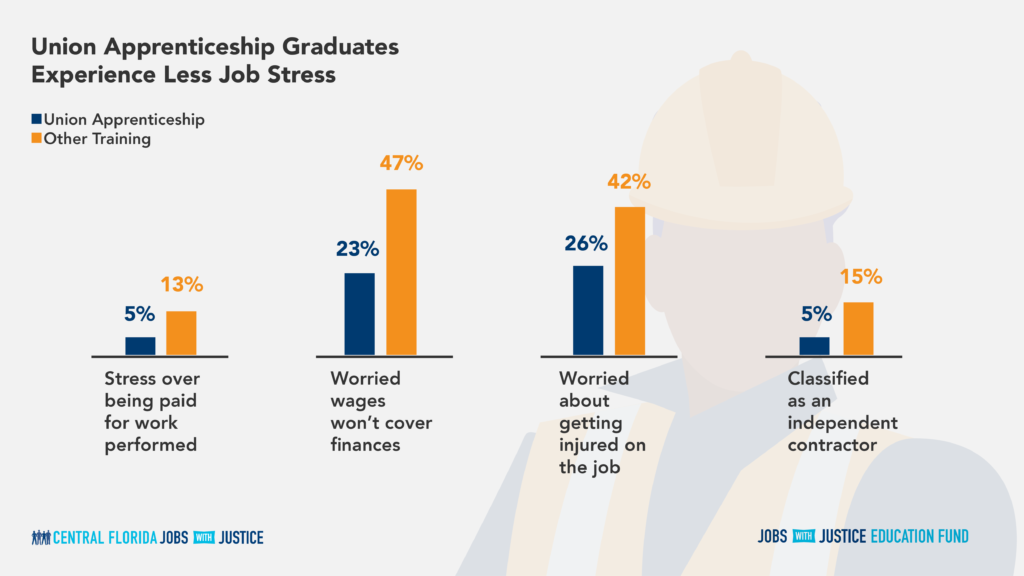
The construction sector in Central Florida has seen immense growth in recent years, buoyed by a wave of tourism and housing demand that has spurred rapid development, and accompanying that boom has been construction sector jobs. In fact, even in the middle of a global pandemic that has put everything on pause, the metro Orlando area is only 1,500 jobs short of its October 2019 peak of 87,100 construction employees, according to the U.S. Bureau of Labor Statistics.
“We identified expansion pretty easily, from the extension of the University of Central Florida’s campus into downtown Orlando to the growth of the local interstate (I-4) here,” says Chris Furino, Membership and Lead Organizer at Central Florida Jobs With Justice. “Because of this, we wanted to get a broader understanding of the wages, working conditions, and training workers were getting on these jobs.” To get at these dynamics, Central Florida Jobs With Justice commissioned a groundbreaking report titled, “Central Florida Construction Survey: Workers Benefit from Apprenticeship, Industry Challenges Remain.
Among the report’s key findings were unions represented workers far better than non-union workers regarding wages and benefits. Not only did union-represented workers average $2 per hour more, but they were also five times more likely to be higher wage earners than nonunion workers. The study also found that compared to other types of training, workers who graduated from registered apprenticeship programs run by unions and contractors fared better than other training graduates in terms of wages, benefits, and lower levels of work-related stress. This is partly because these union-run apprenticeship programs tend to be available at no cost, while workers are expected to pay training fees out of their own pockets.
The report also looked at the experiences of workers of color and women. Testing for worker perceptions, the report concluded that a union contract made workers feel more comfortable reporting instances of discrimination than a nonunion contract did. And women and people of color who are covered by a union contract also received better compensation than their non-union counterparts, earning $2.50/hour more on average, less likely to be on the lower pay scale, and more than twice as likely to receive health and retirement benefits. Fewer instances of workplace injuries going unresolved were discovered under union contracts as well.
While the report clearly demonstrates the vitality of unions for the worker, Furino argues that thinking through the dynamic of Climate Change and how it intersects with the industry is just as important. “Workers in this sector are climate workers and impacted by the way the climate is changing. Rising temperatures mean more heat stress on the job,” they point out. “Much of our infrastructure, like wastewater maintenance systems, need to be updated. Just two months ago in Tampa, there was a reservoir at a phosphate plant that collapsed because it wasn’t sufficiently maintained, causing much pollution to the Tampa Bay area. The workers who will be on these jobs maintaining and repairing our infrastructure are construction workers.”
In Case You Missed It!
LRAN Conference a Shining Success
The 10th annual Labor Research Action Network (LRAN) conference was held virtually on June 16th and 17th, with in-person gatherings in Washington D.C., Boston, and LA. It was our largest attendance yet, with nearly 250 people registered. With the theme “What Did Workers Teach Us in 2020?” we heard from labor campaigners and scholars from across the country who have been engaged in building collective worker power and confronting the massive challenges and opportunities posed by the pandemic. People shared lessons learned through campaigns and research across a range of sectors (education, service, warehousing) and involving many issues (safety & health, immigration, racial justice). The keynote session spotlighted the effort by Amazon workers in Bessemer to organize. Moderator Steven Pitts of the Black Work Talk podcast generated a thoughtful and candid conversation with RWDSU President Stuart Appelbaum and RWDSU Midsouth Council organizer Michael Foster. Our 2020 LRAN New Scholar award grantees also shared their research at the conference, which raised over $24,000 towards the 2022 grant competition.
Worker Solidarity Fund Impact Report
When we created the Worker Solidarity Fund in April 2020, the fund was designed to align with our theory of change for a worker-led economic democracy. This meant strengthening existing mutual aid networks and ensuring workers had real decision-making power. This vision has come to life in our recent Worker Solidarity Fund impact report. In this document, you will see our theory take shape in the story of Black sanitation workers in New Orleans and the story of Claudia, an undocumented immigrant residing in Massachusetts. You will also learn how the Worker Solidarity fund directly helped working people across states and sectors. Together, we have made an incredible impact on working people during one of the most difficult times in recent memory.
Join us as we take a moment to reflect on the Worker Solidarity Fund’s impact so far through our Impact Report!
Zine Submissions Needed
Jobs With Justice is thrilled to call for submissions for the first issue of our brand-new zine, titled “PTO!” The prompt for submissions can be found in the above graphic or by visiting the dedicated webpage for the zine. Please send it out to anyone you think would like to offer a submission for consideration. The deadline is July 15. Please send submissions via email to mackenzieriver@jwj.org.
Be a Part of Unified Action Team
The Unified Action Team is a core group of activists from around the country who are ready to jump in and take action at a moment’s notice. From digital actions to trainings and other special events, it is an opportunity to get–and stay–involved with Jobs With Justice. Sign-up for the Jobs With Justice Unified Action Team TODAY and be part of a growing team ready to take action, listen, learn, and help build the movement to ensure working people have a voice on the job, in their communities, and in our democracy.

